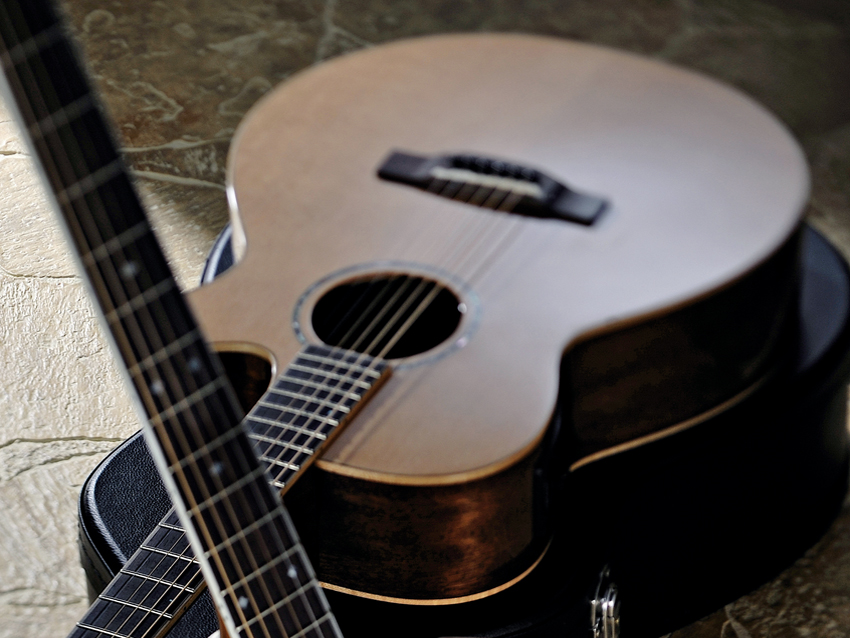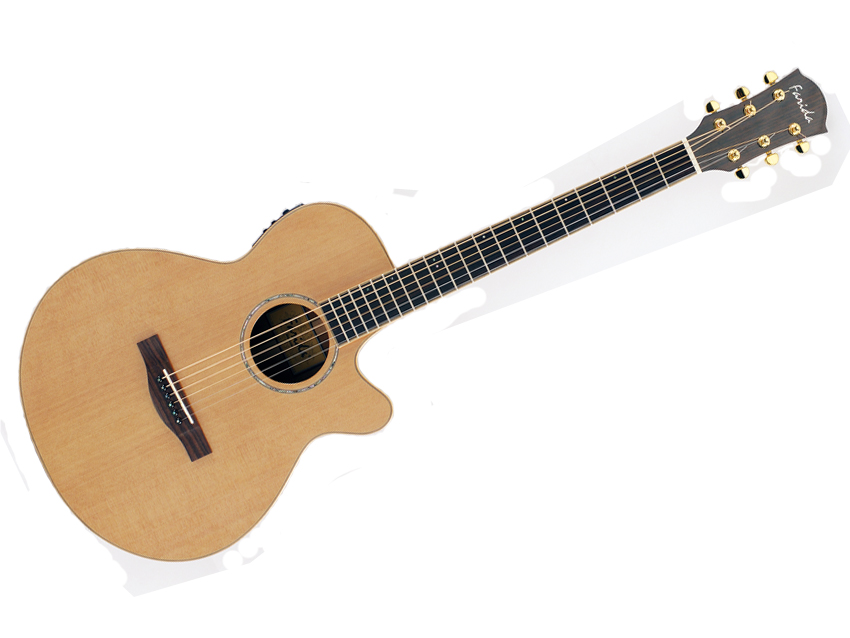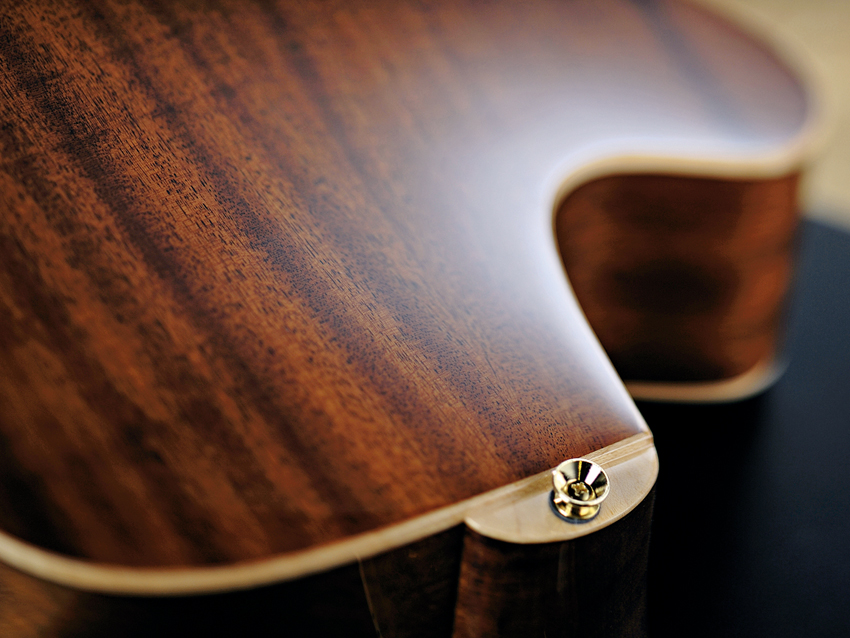MusicRadar Verdict
A well-built electro with a mid-heavy output ideal for band use.
Pros
- +
Build quality. Simplicity of presentation.
Cons
- -
Lacks some tonal subtlety.
MusicRadar's got your back

A-62 CENA

A-62 CENA

A-62 CENA
Farida Guitars is a still comparatively new brand seeking to make its mark in the highly competitive, mid- priced sector of the market.
Its range includes 'dry' acoustics and electros with the aim of distancing itself from the pack by offering superior workmanship at comparable price points. On test here we have a brand new model, with the aim of being an affordable, stage-ready electro.
"The selected timbers appear to be of good quality, although the cedar's grain isn't as ruler-sharp as some we've seen."
The A-62 CENA (Cutaway Electro Natural) is Farida's new top-of-the-range grand auditorium and is essentially a super-sized version of the A-22NSCE.
It comes with a fitted hard case and features the Fishman Presys Blend pickup system, which utilises an internal mic and undersaddle pickup.
The Fishman's control panel is mounted in the traditional position on the upper shoulder and is home to six rotaries; one each for bass, middle and treble (centre detented), volume, notch and mic blend, as well as push buttons for phase and the chromatic tuner. When active, the tuner mutes the output.
Build
The A-62 is wider across its lower bout than its little brother, the A-22, which pushes it into grand auditorium territory.
Measuring a little short of 381mm (15-inches) at its widest and just less than 483mm (19-inches) in height, the A-62 is slightly narrower and shorter than a standard Martin OM.
Want all the hottest music and gear news, reviews, deals, features and more, direct to your inbox? Sign up here.
This hybrid shape endeavours to offer the best of both worlds: enough finesse for fingerstyle coupled with a dollop of boom for strumming.
As an all-solid wood guitar, the A-62's top is constructed from Canadian red cedar, the two-piece back and sides from African mahogany. The selected timbers appear to be of good quality, although the cedar's grain isn't as ruler- straight as some similarly priced electros we've seen.
Neither the pieces to the front or back of the guitar have been bookmatched, though perhaps only the most fastidious of purchaser would complain.
Decoration is sparse, with understated black double coachlining sitting inside the flame maple binding, while simple bridge pin dots and a very unfussy abalone soundhole rosette is all that adorns the guitar's top. As with most Faridas, 'bling' isn't a primary consideration.
The A-62's rosewood fingerboard is, however, with flame maple and houses 20 slightly squared-off frets with abalone mini-dot fret markers. The two-piece mahogany neck is finished with more flame maple at the heel and a gold-plated strap button.
A rosewood-faced headstock sports the Farida logo and houses Grover enclosed tuners. On test, we experienced some problems with keeping the A-62 in tune - mainly on the bass strings.
This is perhaps more down to the stretching of new strings and/or the nut grooves than below-par tuners, and perhaps indicates a little more care is needed in set-up.
But with an eye on improved tone, it's good to see Farida fit bone nut and saddles - this can often be an area where corners are cut by using lower quality substitutes, particularly at this price point, but not so here.
Under scrutiny, it's hard not to be impressed with the A-62's build quality and construction. Farida obviously has measures in place for stringent quality control and the results are evident for all to see.
The guitar feels sturdy yet lightweight, joints are tight and solid and all areas of the guitar are squeaky clean. Even the sculpting to the bracing strut forward of the soundhole, which affords easier access to the foot of the truss rod, has been very neatly finished. Full marks to Farida for top-drawer build quality.
Our only niggle is the high-gloss finish that seems unusually thick - clearly, a thicker finish will give the guitar more durability, but it can hinder the acoustic performance of a guitar as well as feel a little 'gloopy' to touch. Perhaps a little less enthusiasm in the spray shop is required?
Sounds
Bearing in mind its size, the A-62 produces a mighty punch. With a very mid-heavy timbre, the A-62 fills a room with a bright, dry tone. While having plenty of projection, on occasion the tone borders on brash, particularly when pushed.
A softer approach is required to tease out the warmer side of its character. Comparing it to similarly priced electros (including Freshman and Tanglewood models), the Farida is a louder guitar, while the comparative models offer more bass and warmth.
Employing the onboard Fishman Presys Blend system gives more control over the A-62's tendency to sound harsh, though the smaller rotaries are a little fiddly to use. In general, the best amplified results come from scooping out 90 per cent of the mids while biasing the output to the piezo.
Sweeping toward the mic, we notice an increase in mids coupled with a distinct drop in volume. The most usable and likeable tones come from rolling on most of the bass on offer with just a little extra treble. These settings suit fingerstyle playing and, with a little extra boost to the treble, suit hearty strumming too.
In short, the guitar itself produces so much mid-range that it requires taming, a role the Fishman is well capable of performing.
Farida has proved that it can produce affordable guitars with first-rate build quality and our review model only serve to enforce this.
It's not the most tonally balanced acoustic we've experienced at this price, but we feel it could work in favour of the guitars in their primary on-stage role, especially if you need to be heard above other musicians.
Either way, if you're in this market area, we strongly suggest you add a Farida to your shortlist.
Steve Harvey is senior content producer for Pro Sound News and also contributes to other Future brands. He has worked in the pro audio industry — as a touring musician as well as in live production, installed sound, and equipment sales and marketing — since November 1980.